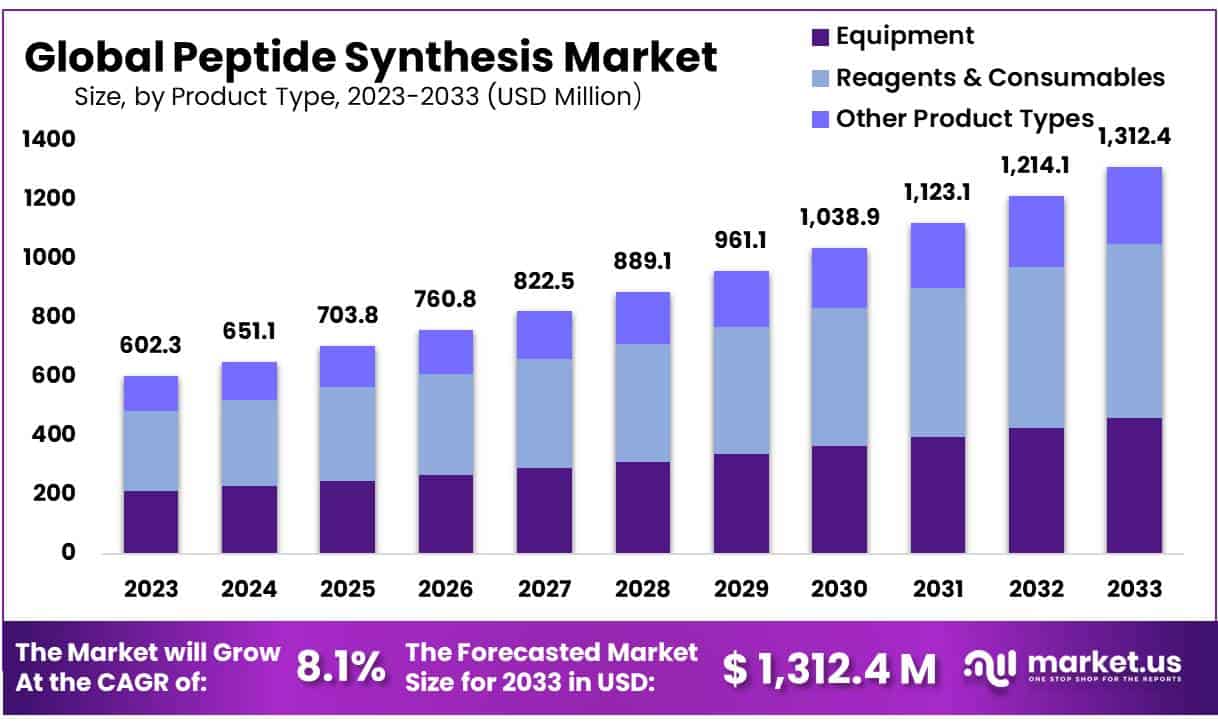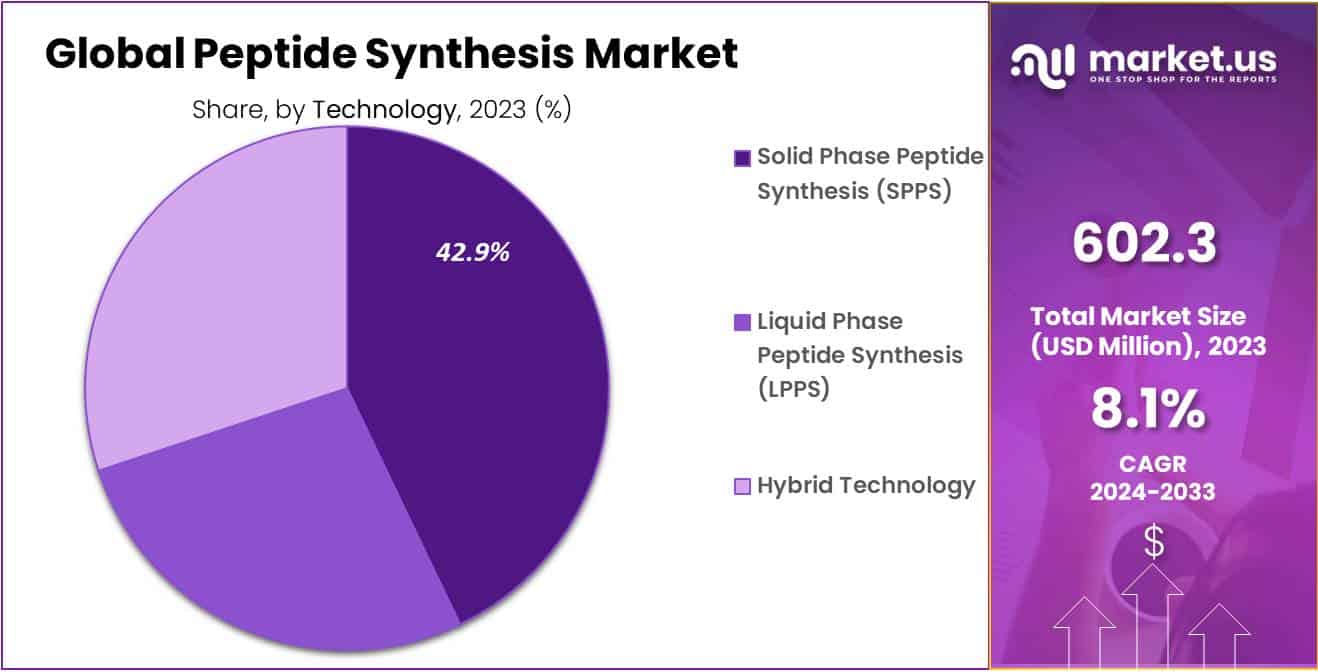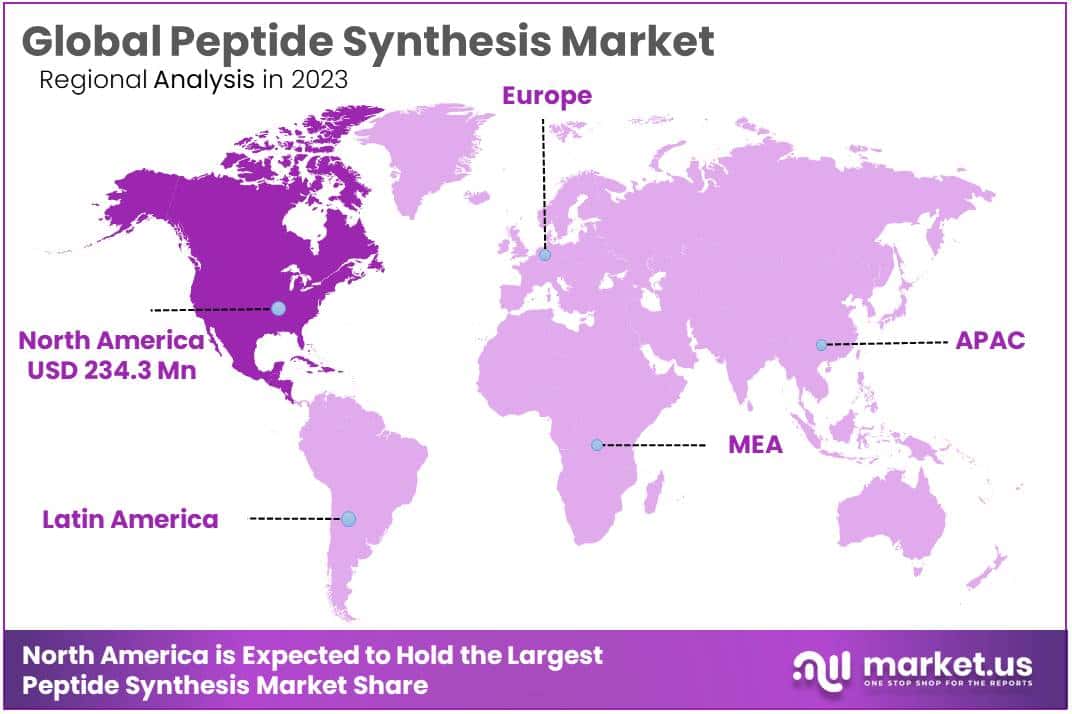Global Peptide Synthesis Market By Product Type(Equipment, Reagents & Consumables, Other Product Types) By Technology (Solid Phase Peptide Synthesis (SPPS), Liquid Phase Peptide Synthesis (LPPS), Hybrid Technology) By Application-Therapeutics(Cancer, Metabolic, Cardiovascular Disorder, Respiratory, GIT (Gastrointestinal Disorders), Infectious Diseases, Pain, Dermatology, CNS, Renal, Others) By Diagnosis, By Research, By End-use (Pharmaceutical & Biotechnology Companies, Contract Development & Manufacturing Organization/Contract Research Organization, Academic & Research Institutes) By Region and Key Companies - Industry Segment Outlook, Market Assessment, Competition Scenario, Trends and Forecast 2024–2033
- Published date: Feb 2024
- Report ID: 18814
- Number of Pages: 393
- Format:
-
keyboard_arrow_up
Quick Navigation
Market Overview
The Global Peptide Synthesis Market size is expected to be worth around USD 1312.4 Million by 2033 from USD 602.3 Million in 2023, growing at a CAGR of 8.1% during the forecast period from 2024 to 2033.
Peptides serve as highly selective signaling molecules, binding directly with specific receptors on cells’ surfaces – including ion channels or G protein-coupled receptors (GPCRs) – on cell surfaces for trans-activating intracellular responses. Peptides offer exceptional pharmacological properties and properties, making them the ideal starting point for developing novel therapeutic approaches.
The report on the Peptide Synthesis Market offers an in-depth analysis of market trends, drivers, restraints, opportunities, etc. Along with qualitative information, this report includes the quantitative analysis of various segments in terms of market share, growth, opportunity analysis, market value, etc. for the forecast years. The global peptide synthesis market is segmented based on type, application, and geography.
Peptide-based drugs offer tailored therapeutic approaches that meet each person’s specific needs more efficiently than generic options do. These circumstances necessitate employing advanced peptide synthesis techniques to produce customized peptides for every individual patient, increasing demand for products and services related to peptide synthesis. In 2021, according to estimates by the International Diabetes Federation, approximately 537 million adults between ages 20-79 worldwide had diabetes – this represents nearly one out of every 10 individuals worldwide. 541 million individuals had impaired glucose tolerance (IGT), placing them at greater risk of type 2 diabetes and leading to anticipated increases in demand for peptide drugs and market expansion.

Key Takeaways
- Market Size: Peptide Synthesis Market size is expected to be worth around USD 1312.4 Million by 2033 from USD 602.3 Million in 2023.
- Market Growth: The market growing at a CAGR of 8.1% during the forecast period from 2024 to 2033.
- Product Type Analysis: Reagents and Consumables account for an impressive 45% market share in the Peptide Synthesis Market.
- Technology Analysis: Solid-Phase Peptide Synthesis (SPPS) holds an impressive 42.9% market share.
- Application Analysis: Peptide Synthesis Market Leader Research holds an impressive 66.8% share.
- End-Use Analysis: Pharmaceutical and biotechnology companies hold the majority of market shares for Peptide Synthesis Market with 48.6% market share in 2023.
- Regional Analysis: North America held the highest market share for global peptide synthesis at 38.9% in 2023.
Product Type Analysis
Reagents and Consumables account for an impressive 45% market share in the Peptide Synthesis Market, serving an integral role in producing peptides. Reagents include chemicals, solvents, and buffers needed for production while consumables include solid-phase resins, amino acids, and purification columns – their demand is driven by the rising adoption of peptide therapies in pharmaceutical research and drug development.
Equipment, another key segment of the market, comprises synthesizers, purification systems, and chromatography equipment used for peptide synthesis workflows. While equipment makes up a substantial share of this segment of the market, its share is outpaced by consumable purchases due to its recurring nature.
Other Product Types in the Peptide Synthesis Market include software solutions, custom synthesis services, and peptide libraries – these offerings cater to specific research needs while adding value for customers searching for comprehensive peptide synthesis solutions. While comprising only a smaller portion of this industry’s overall growth and diversity.
Technology Analysis
Solid-Phase Peptide Synthesis (SPPS) holds an impressive 42.9% market share for Peptide Synthesis Market. SPPS is a widely adopted technology known for its efficiency, scalability, and versatility in synthesizing peptides of all lengths and complexities; anchoring chains to solid supports to allow sequential addition of amino acids before purification steps can yield high-quality peptide products; this makes SPPS indispensable in pharmaceutical research, drug discovery, and biotechnology applications.
Liquid Phase Peptide Synthesis (LPPS) represents another approach to peptide synthesis, although with less market share compared to SPPS. LPPS involves the chemical assembly of peptides in the solution phase, offering advantages such as rapid production times and flexibility when handling sensitive sequences.
Hybrid Technology incorporates elements from both SPPS and LPPS processes, combining their advantages to optimize peptide synthesis processes. This novel approach offers greater control of parameters during peptide synthesis as well as customization of protocols to meet specific research requirements; further propelling its adoption in the market for peptide synthesis.
Application Analysis
Peptide Synthesis Market Leader Research holds an impressive 66.8% share, as research applications of synthesized peptides span across various fields including pharmaceuticals, biotechnology and academic. Synthesized peptides have proven invaluable tools in uncovering biological processes while expanding scientific understanding.
Therapeutic applications represent another key application area within the peptide synthesis market. Peptide-based therapeutics offer several advantages over their chemically produced alternatives, including target specificity, reduced toxicity, and potential oral administration. As a result, there’s growing interest in such drugs to treat cancer, diabetes, cardiovascular disorders, or infectious diseases.
Peptides also find use in diagnostics, although their market share remains smaller compared to research and therapeutics. Peptide diagnostic tools like biomarkers and imaging agents play an integral part in disease detection, monitoring, and personalized medicine approaches; thanks to advances in peptide synthesis technology driving innovation the market for peptide therapeutics and diagnostics is set for further growth and expansion.
End-user Analysis
Pharmaceutical and biotechnology companies hold the majority of market shares for Peptide Synthesis Market with 48.6% market share, driving demand for synthesized peptides used for drug discovery, development, manufacturing processes as well as therapeutic agent development against cancer, metabolic disorders and infectious diseases. Pharma/biotech firms depend on synthesized peptides for preclinical/clinical studies as well as formulation optimization and large scale production of drugs containing them.
Contract Development & Manufacturing Organizations (CDMOs/CROs) play a pivotal role in the market for peptide synthesis, providing expertise and infrastructure necessary for contract peptide manufacturing. Pharmaceutical companies frequently outsource to these CDMOs/CROs because their services offer cost-effective solutions for both process development and peptide synthesis needs.
Academic and research institutes also represent an integral end-user segment, though with a smaller market share compared to pharmaceutical and biotechnology companies. These institutions make an invaluable contribution to peptide synthesis research, innovation, education, therapeutics, diagnostics and basic science through collaborative efforts between academic researchers and industry players that foster growth and innovation within this market.

Key Market Segments
Product Type
- Equipment
- Reagents & Consumables
- Other Product Types
Technology
- Solid Phase Peptide Synthesis (SPPS)
- Liquid Phase Peptide Synthesis (LPPS)
- Hybrid Technology
Application
- Therapeutics
- Cancer
- Metabolic
- Cardiovascular Disorder
- Respiratory
- GIT (Gastrointestinal Disorders)
- Infectious Diseases
- Pain
- Dermatology
- CNS
- Renal
- Others
- Diagnosis
- Research
End-use
- Pharmaceutical & Biotechnology Companies
- Contract Development & Manufacturing Organization/Contract Research Organization
- Academic & Research Institutes
Driver
Increasing Demand for Peptide-Based Therapeutics
With chronic diseases like cancer, diabetes and cardiovascular conditions on the rise, demand for peptide-based therapeutics has skyrocketed in response to this rising epidemic. Peptides offer advantages like high target specificity, lower toxicity and attractive pharmacokinetic profiles which make them attractive candidates for drug development projects.
Technological Advancements in Peptine Synthesis
Advancements in peptide synthesis technologies such as solid-phase peptide synthesis (SPPS) and microwave-assisted peptide synthesis have greatly advanced efficiency, scalability, cost-effectiveness and purity synthesis capabilities, meeting the evolving demands of pharmaceutical and biotechnology companies alike. These technological innovations facilitate creating complex peptides of greater purity with increased yield to meet evolving pharmaceutical/biotech requirements.
Trend
Rise in Personalized Medicine
As more healthcare becomes personalized, diagnostics and therapeutics utilizing peptide-based diagnostics and therapies tailored specifically for individual patient characteristics has increased significantly. Peptides offer flexibility to target disease pathways or biomarkers for more targeted treatments for conditions like cancer or autoimmune diseases.
Expansion of Peptide Libraries and Screening Services
There has been an exponentially expanding trend toward using peptide libraries and screening services for drug discovery and development, specifically high-throughput screening of diverse peptide sequences to quickly identify therapeutic candidates for therapeutic development. As such, companies offering such services have seen greater demand among pharmaceutical and biotech firms alike.
Restraint
Inadequate Capital Resources for Peptine Synthesis
Peptide synthesis can be prohibitively expensive for some companies, particularly smaller biotech firms and academic research labs, especially when producing long or complex sequences, due to raw materials, equipment and labor expenses; this poses a barrier to market expansion.
Manufacturing Scale-up Challenges
Transitioning from laboratory-scale production of peptide synthesis to commercial scale can present many hurdles and barriers, including process optimization, scalability and cost efficiency issues. Achieve consistent quality while simultaneously lowering production costs remains a significant barrier in this market for manufacturers in peptide synthesis production.
Opportunities
Expanding Applications in Drug Delivery and Diagnostics
Peptides Pose Significant Market Growth Prospects The versatility of peptides presents great market growth prospects. Peptide-based drug delivery systems feature targeted delivery, enhanced bioavailability and reduced side effects – leading to their adoption across therapeutic fields. Peptides also play a growing role as imaging agents or biomarkers used for disease diagnosis or monitoring purposes.
Rapid Expansion in Biotechnology and Pharmaceutical Industries
With rapid expansions occurring across biotech and pharmaceutical sectors globally, emerging markets represent excellent opportunities for market players involved with peptide synthesis. Increases in drug development expenditure combined with advances in biologics and personalized medicine has increased investment into synthetic peptide production for novel therapeutic agents; capitalizing on expanding opportunities could propel sustained market expansion of peptide synthesis market participants.
Regional Analysis
North America held the highest market share for global peptide synthesis at 38.9% in 2023. This performance can be attributed to increased investments into structure-based medication designs, genomics and proteomics research and personalized treatments being produced within North America – particularly within the US where research efforts had expanded rapidly due to increasing cancer cases and chronic disorders. The United States held the greatest share of North American market within North America itself due to their expanding efforts for life science research as well as rising incidence rates of chronic disorders like cancer

Key Regions and Countries
North America
- The US
- Canada
- Mexico
Western Europe
- Germany
- France
- The UK
- Spain
- Italy
- Portugal
- Ireland
- Austria
- Switzerland
- Benelux
- Nordic
- Rest of Western Europe
Eastern Europe
- Russia
- Poland
- The Czech Republic
- Greece
- Rest of Eastern Europe
APAC
- China
- Japan
- South Korea
- India
- Australia & New Zealand
- Indonesia
- Malaysia
- Philippines
- Singapore
- Thailand
- Vietnam
- Rest of APAC
Latin America
- Brazil
- Colombia
- Chile
- Argentina
- Costa Rica
- Rest of Latin America
Middle East & Africa
- Algeria
- Egypt
- Israel
- Kuwait
- Nigeria
- Saudi Arabia
- South Africa
- Turkey
- United Arab Emirates
- Rest of MEA
Market Player Analysis
The competitive landscape of peptide synthesis offers insights into each company involved, providing information about financial performance, revenue generation, market potential, R&D investments, new market strategies, global presence of production facilities and capacities as well as strengths and weaknesses of product launches, range expansion and application dominance of each competitor in this space. These data points offer information that highlights their activities relevant to market dominance.
Key Market Players
- Lonza
- MP Biomedicals
- Novo Nordisk A/S.
- Genscript Biotech
- CEM Corporation
- Thermo Fisher
- Creative Diagnostics
- Polypeptide Group
- Syngene, PuroSynth
- Merck KGaA
- Bachem Holdings
- Biotage
Recent Developments
- Lonza: Launched a new line of “Green” peptides synthesized using environmentally friendly protocols.
- Novo Nordisk A/S.: Investigating the use of peptides for other therapeutic applications, such as obesity and heart disease.
- Genscript Biotech: Developed new capabilities for peptide-drug conjugate (PDC) production.
- CEM Corporation: Launched a new generation of Liberty microwave peptide synthesizers with improved efficiency and automation.
- Thermo Fisher Scientific: Acquired Peptagen, a leading provider of peptide synthesis services
Report Scope
Report Features Description Market Value (2023) USD 602.3 Million Forecast Revenue (2033) USD 1312.4 Million CAGR (2024-2033) 8.1% Base Year for Estimation 2023 Historic Period 2018-2022 Forecast Period 2024-2033 Report Coverage Revenue Forecast, Market Dynamics, Competitive Landscape, Recent Developments Segments Covered By Product Type(Equipment, Reagents & Consumables, Other Product Types) By Technology (Solid Phase Peptide Synthesis (SPPS), Liquid Phase Peptide Synthesis (LPPS), Hybrid Technology) By Application-Therapeutics(Cancer, Metabolic, Cardiovascular Disorder, Respiratory, GIT (Gastrointestinal Disorders), Infectious Diseases, Pain, Dermatology, CNS, Renal, Others) By Diagnosis, By Research, By End-use (Pharmaceutical & Biotechnology Companies, Contract Development & Manufacturing Organization/Contract Research Organization, Academic & Research Institutes) Regional Analysis North America-US, Canada, Mexico;Europe-Germany, UK, France, Italy, Russia, Spain, Rest of Europe;APAC-China, Japan, South Korea, India, Rest of Asia-Pacific;South America-Brazil, Argentina, Rest of South America;MEA-GCC, South Africa, Israel, Rest of MEA Competitive Landscape Lonza, MP Biomedicals, Novo Nordisk A/S., Genscript Biotech, CEM Corporation, Thermo Fisher, Creative Diagnostics, Polypeptide Group, Syngene, PuroSynth, Merck KGaA, Bachem Holdings, Biotage Customization Scope Customization for segments, region/country-level will be provided. Moreover, additional customization can be done based on the requirements. Purchase Options We have three licenses to opt for: Single User License, Multi-User License (Up to 5 Users), Corporate Use License (Unlimited User and Printable PDF) Frequently Asked Questions (FAQ)
What is peptide synthesis?Peptide synthesis is the chemical process of creating peptides, which are short chains of amino acids linked together by peptide bonds.
How big is the Peptide Synthesis Market?The global Peptide Synthesis Market size was estimated at USD 602.3 Million in 2023 and is expected to reach USD 1312.4 Million in 2033.
What is the Peptide Synthesis Market growth?The global Peptide Synthesis Market is expected to grow at a compound annual growth rate of 8.1%. From 2024 To 2033
Who are the key companies/players in the Peptide Synthesis Market?Some of the key players in the Peptide Synthesis Markets are Lonza, MP Biomedicals, Novo Nordisk A/S., Genscript Biotech, CEM Corporation, Thermo Fisher, Creative Diagnostics, Polypeptide Group, Syngene, PuroSynth, Merck KGaA, Bachem Holdings, Biotage.
What are peptides used for?Peptides have various applications, including drug discovery, therapeutic development, diagnostics, and research in fields such as pharmaceuticals, biotechnology, and academia.
What methods are used for peptide synthesis?Common methods for peptide synthesis include solid-phase peptide synthesis (SPPS), liquid-phase peptide synthesis (LPPS), and hybrid approaches combining elements of both methods.
What factors drive the growth of the peptide synthesis market?Market growth is driven by increasing demand for peptide-based therapeutics, advancements in peptide synthesis technology, rising prevalence of chronic diseases, and expanding applications in drug discovery and diagnostics.
What are the main challenges faced by the peptide synthesis market?Challenges include high production costs, complexity in scaling up synthesis processes, and the need for continuous innovation to meet evolving customer needs and regulatory requirements.

-
-
- Lonza
- MP Biomedicals
- Novo Nordisk A/S.
- Genscript Biotech
- CEM Corporation
- Thermo Fisher
- Creative Diagnostics
- Polypeptide Group
- Syngene, PuroSynth
- Merck KGaA
- Bachem Holdings
- Biotage










